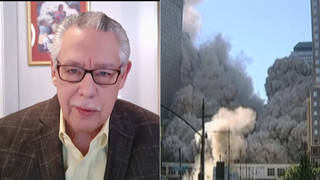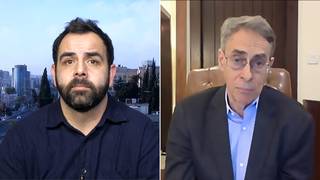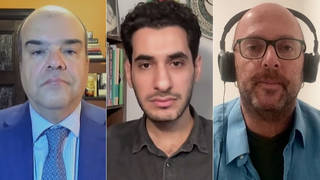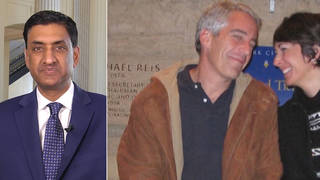
Guests
- Muhammad Shehadawriter and analyst from Gaza.
Canada became the latest Western country this week to announce it will recognize the state of Palestine, joining the United Kingdom and France, as well as over 147 other countries that already recognize Palestinian statehood. Palestinian writer and analyst Muhammad Shehada says that while the recent moves are “largely symbolic” and filled with caveats and loopholes, it shows that global opinion is rapidly shifting. He says that despite Israel’s growing diplomatic isolation over its starvation of Gaza, the only thing that will stop the genocide is if the United States uses its leverage.
“Netanyahu and the Israeli government are terrified of Trump. They don’t want to anger him,” says Shehada. “The only thing it would take is Trump making a phone call to Netanyahu and saying, 'End this now.'”
Transcript
AMY GOODMAN: This is Democracy Now!, democracynow.org, The War and Peace Report. I’m Amy Goodman, with Nermeen Shaikh.
NERMEEN SHAIKH: On Wednesday, Canada became the latest country to announce plans to recognize a Palestinian state, joining recent calls by France and the U.K. Prime Minister Mark Carney spoke in Ottawa.
PRIME MINISTER MARK CARNEY: Canada intends to recognize the state of Palestine at the 80th session of the United Nations General Assembly in September 2025. This intention is predicated on the Palestinian Authority’s commitment to much-needed reforms, including commitments by the Palestinian Authority’s President Abbas to fundamentally reform its governance, to hold general elections in 2026, in which Hamas can play no part, and to demilitarize the Palestinian state.
AMY GOODMAN: Israel blasted Canada’s move, calling it a, quote, “reward for Hamas.” President Trump wrote on Truth Social, quote, “That will make it very hard for us to make a Trade Deal with them.” He was referring to Canada.
Meanwhile, Qatar, Saudi Arabia and Egypt and other Arab nations have joined a call for Hamas to disarm and end its rule in Gaza. The countries signed on to a joint call agreed to at a U.N. conference here in New York co-hosted by Saudi Arabia and France to build support for a two-state solution.
For more, we’re joined by Muhammad Shehada, writer and analyst from Gaza. He’s in Copenhagen, visiting fellow at the European Council on Foreign Relations.
Muhammad, welcome back to Democracy Now! Talk about these political developments, both the U.K., France, Canada saying they’re going to recognize Palestine as a state, and then Saudi Arabia, Egypt saying that Hamas has to disarm.
MUHAMMAD SHEHADA: Absolutely. Thanks, Amy, for having me.
The first thing to emphasize is that this is no way a reward for Hamas. It’s actually — it proves hard-liners within Hamas wrong when they say that nonviolence or advocacy do not work, diplomatic engagement is futile, and might makes right, violence is the only way, when you give Palestinian moderates a victory of this symbolic nature to argue with their hard-line peers and say, “Look, there is an alternative path.” This is in no way a reward for Hamas.
What is actually a gift to hard-liners is the Trump administration, literally about five minutes ago, imposing sanctions on Palestinian Authority officials, PLO officials, for trying to seek justice through the international court system, the Court of Justice and Criminal Court, and saying that this is a step too far.
In terms of these promises of recognition, it’s largely symbolic. It’s filled with caveats, loopholes and qualifiers and conditions. Countries are deferring it until September, and some countries are saying, “We would recognize, if Israel does not end the genocide in Gaza by then.” But even then, even with these hesitant, small steps, Israelis are saying this is dealing a significant amount of pain to the Israeli government. You had Barak Ravid, one of the most prominent Israeli journalists, who was saying yesterday that this is the worst diplomatic defeat Israel has suffered since its creation.
And it is for three reasons. Number one, it’s because the two-state solution is a conversation Israel does not want to have at all, because once you begin to say, “OK, let’s move towards peace,” Israel would see this as a “peace offensive.” That’s literally a term that Israeli security strategist Avner Yaniv coined. And they would see it as a threat, because that conversation would expose and lay bare who is the rejectionist party. Now you have consensus in the Israeli mainstream, wall to wall, including the opposition parties, that are saying — like Yair Golan, Yair Lapid, Benny Gantz are saying there’s not going to be any Palestinian state anytime soon. And you don’t want to open that conversation, because it is going to show that Israel is the one that’s rejecting it. Like, one of the reasons why Israel’s propaganda is failing miserably, it’s because Israel has gone too extreme that it became a political suicide for any Israeli diplomat or politician to even fake support for peace and the two-state solution. They would lose their jobs immediately.
And the second reason is because Israel is trying to sell a fantasy of ethnic cleansing in Gaza and in the West Bank as the ultimate solution to the Palestinian question, to tell the Trump administration that the most humane thing we can do to Palestinians is to kick them all out of Gaza and turn it into a riviera. But when you have countries that are saying, “Look, here’s a solid political check that can end this occupation, end Israel’s apartheid, allow both sides to live in peace,” and that political check is endorsed by every single Palestinian political party, including Hamas — Hamas said, “We will dismantle our arms. We will dismantle ourselves, lay down our arms, if Israel ends the occupation.” If you try to say, “No, there is this alternative plan,” Israel would be threatened by that. That’s when even, like, Emmanuel Macron, the French president, he said in Singapore a month ago — he was saying something like, “We will recognize Palestine on these multiple conditions: Hamas disarming, Hamas leaving Gaza, Hamas not having any political future.” Israel panicked and immediately attacked him and called it a crusade, because they see it as a threat.
And the third fear is a snowballing effect. We see European governments that are saying recognition is not enough. It needs to be coupled with pressure on Israel, with sanctions, with penalizing measures to advance the Palestinian statehood to the end of the occupation. This morning, the Swedish prime minister, who is a right-wing coalition leader that is pro-Israeli for a very long time, was saying this morning, “We need to impose these economic sanctions on Israel under the Association Agreement.” So, that’s something that Israel is terrified of.
NERMEEN SHAIKH: And so, Muhammad, you know, just to go back to the question of recognition, only to point out that the state of Palestine is recognized by 147 of the 193 U.N. member states. So, you know, if you could elaborate on the position that France, the U.K. and Canada have taken, the distinction between their position and the position the U.S. is taking? Because, as you’ve pointed out, European governments have now moved from calling for the absolute destruction or dismantling of Hamas, and Israel’s right to do so, to calling on Hamas to hand over its weapons and rule in Gaza to the Palestinian Authority, while leaving the door open for Hamas to join the PLO.
MUHAMMAD SHEHADA: Absolutely, Nermeen. There’s a significant shift here. European governments, early on, were saying Hamas needs to be dismantled, Hamas needs to be destroyed completely, and Israel has a right to do so. They now realize what the Trump administration has not come to realize yet. Trump and his team are still living in the fantasy that Hamas can be destroyed or it can be forced into surrendering, whereas European governments are saying surrender is not going to happen, military defeat is not going to happen.
The most extensive study in history on nonstate armed actors was done by the RAND Corporation, I think in 2008, and they looked at groups like Hamas between the years 1968 until 2008, and they found that only 7% were defeated militarily, 43% through a political process. So, that’s why you see Western governments now saying that Hamas will not be forced into surrender, and Israel has failed to destroy Hamas militarily. The only way you can proceed forward is not a framework of capitulation, but one of decommissioning, like Northern Ireland, trying to get a process of Hamas disarming or laying down its arms, hand in hand with a credible path towards Palestinian statehood.
And that’s what Israel sees as a threat, because Netanyahu is using it as a pretext to maintain an endless war in Gaza by saying, “We need to destroy Hamas,” while doing very close to nothing in that regard. They failed miserably. Twenty-two months of unprecedented warfare in modern history since the World War, it did not defeat Hamas. But the pretext is still being used by the Israeli government, the Israeli military to sustain the genocide in Gaza. So, if you have countries that are offering them a way out, a way to climb down from the tree, a way to disarm Hamas, of course, Israel and the U.S. will react very harshly and in a very hostile manner to this.
AMY GOODMAN: It’s been very interesting to see Trump disassociate himself from Netanyahu’s remarks that there’s no starvation in Gaza. Trump said otherwise. He saw the pictures, he said, on TV. “They look hungry,” he said. As he uses tariffs to attack countries politically, like he wants to protect Bolsonaro in Brazil, who’s on trial for attempting a coup, and he’s going to impose 50% tariffs on Brazil, and attacks other countries, like Canada, for saying they’re going to recognize a Palestinian state, what could he do when it comes to Israel — of course, the U.S. has tremendous ties to Israel, providing a massive amount of most of the weapons in Israel — if he really wanted to push Israel right now? After all, his negotiator, Witkoff, has just arrived in Israel, supposedly to jump-start the so-called peace talks.
MUHAMMAD SHEHADA: Well, there is this American perception that Netanyahu and Trump are very close allies and they love each other a lot. In Israeli media, which I read daily, you have a clear picture that Netanyahu and the Israeli government are terrified of Trump. They don’t want to anger him. That’s why as soon as Trump walked into office, Netanyahu immediately accepted the ceasefire proposal that’s been on the table for seven months or six months prior to Trump assuming office. He accepted immediately a temporary pause in Gaza, and then he tried to wiggle his way out of it. It’s the same that you saw with Trump as soon as he wrote a single tweet telling Netanyahu, “Lay down your arms. Stop bombing Iran.” The ceasefire was instated immediately.
And it’s the same kind of pressure. All it would take is a single phone call from the Trump White House to Netanyahu and his government and saying, “End the genocide in Gaza.” But up until now, by the White House’s own admission — in Axios, Barak Ravid has been reporting on this — you see a consistency in the Trump White House of never trying to pressure Netanyahu at all on Gaza. At most what they do is to tell him, “The war is bad for you. You get to do whatever you want. We will keep giving you weapons and political cover and immunity. It’s just not very good for your health. You make the right choice.” And that is far from bringing a genocide to an end. The only thing it would take is Trump making a phone call to Netanyahu and saying, “End this now.” And that’s something that Netanyahu is terrified about. Every time you see Trump making a statement that there’s a breakthrough in the ceasefire negotiations in Gaza, you see Netanyahu taking a step back and allowing the Israeli team to go to Doha, to Qatar, and negotiate with Hamas, until he bores Trump in the details and tires him mentally, and then the Israeli team is taken back, the blame is put on Hamas, and the genocide continues. It’s the same dynamic over and over.
NERMEEN SHAIKH: So, Muhammad, I just want to go to the comments that Trump made that perhaps were the most harsh, in a way, about the distance that he has, his position, compared to Netanyahu’s position. He responded to questions about starvation in Gaza while speaking to reporters on Air Force One earlier this week, on Tuesday.
PRESIDENT DONALD TRUMP: I think everybody, unless they’re pretty cold-hearted or, worse than that, nuts — there’s nothing you can say other than it’s terrible, when you see the kids. And those are kids — you know, whether they talk starvation or not, those are kids that are starving. That’s — that’s — I mean, they are starving. And you see the mothers. They love them so much, and there’s just nothing they seem to be able to do. They got to get them food. And we’re going to get them food.
NERMEEN SHAIKH: So, Muhammad, if you could respond, very quickly, to what Trump said, and the fact that you’ve said a two-state solution, the conversation is basically dead in Israel? So, what are they saying in the media there?
MUHAMMAD SHEHADA: Well, basically, the Israeli fantasy is that Gazans are going to be pushed out, and the West Bank would be next. Israel already started this process in Jenin and Tulkarem, over 42,000 people displaced already there. So they think they can start it in Gaza and then replicate it in the rest of the Palestinian territory.
But with hunger and Israeli propaganda about this, you see a pattern of Israeli propaganda going to the utmost extremes, like with the GHF massacres. We saw it with our own eyes and ears on camera. We saw witness testimonies, Red Cross statements, Doctors Without Borders statements. And then, the Israeli talking point was it never happened — not just trying to minimize it, but to deny it altogether. And Israeli propaganda at this point, it does not aim to make the case for Israel or persuade you of what is right, but it’s rather to sow confusion, flood the zone with as much confusion as possible, to tire people out mentally, drain them and push them away from the topic, under the pretext of, “Oh, it’s too complicated to follow up on this.”
What you see with Trump is, basically, we’ve reached to a point of incontrovertible, conclusive evidence of mass famine in Gaza, that you have the most notorious Republican, pro-Israeli lawmakers that are admitting there is starvation happening there. So it reached the point of impossible deniability. But Israel is still at the point of saying, “No, it’s not happening. Don’t believe your lying ears and eyes.”
AMY GOODMAN: Muhammad Shehada, we thank you so much for being with us, writer and analyst from Gaza, in Copenhagen, visiting fellow at the European Council on Foreign Relations.
Coming up next, as Trump’s tariff deadline looms, August 1st, where do things stand on trade agreements? Stay with us.
[break]
AMY GOODMAN: “O My Stars” by the late folk musician Michael Hurley in our Democracy Now! studio. To see our interview and his music here, go to democracynow.org.













Media Options